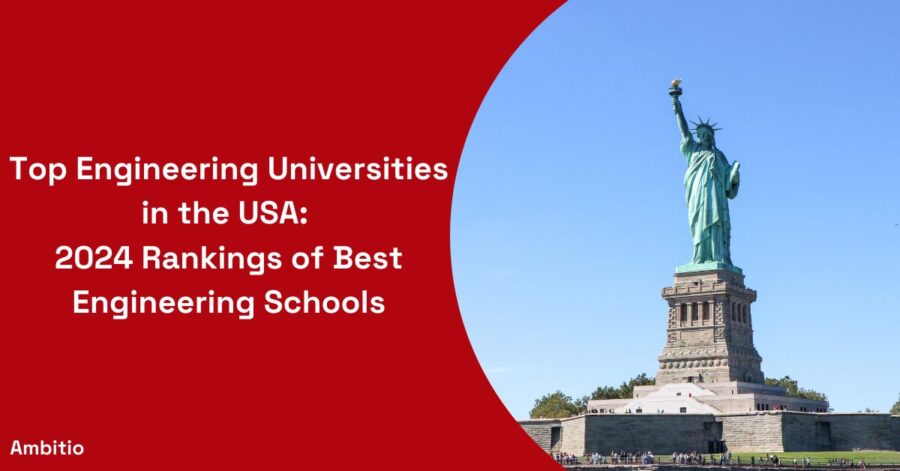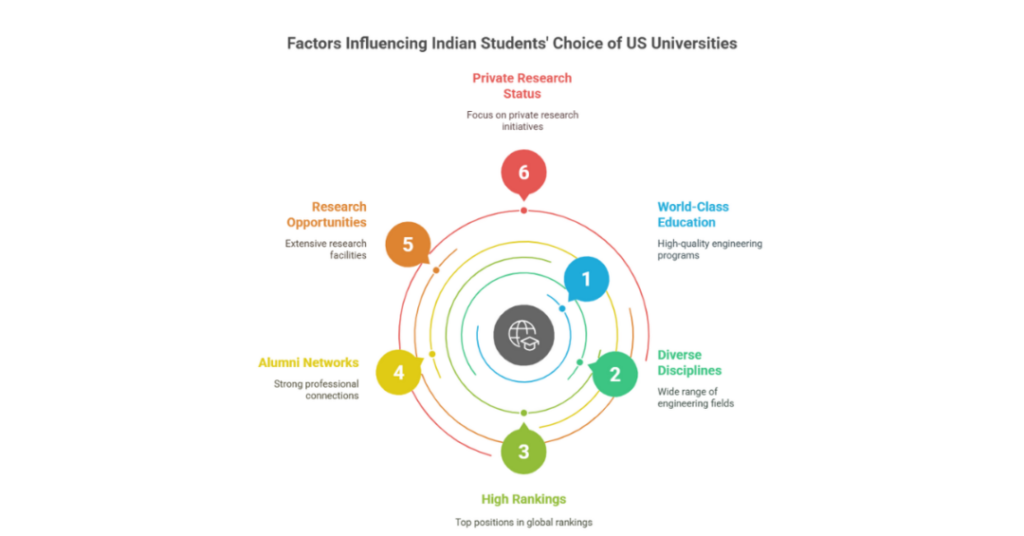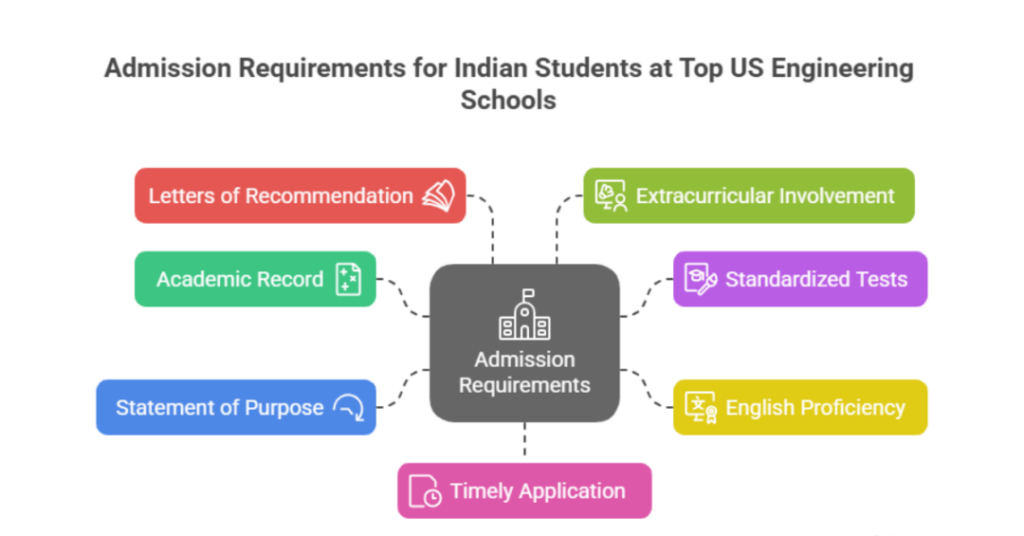21 May 2025
8 minutes read
25 Top Engineering Universities in the USA for Indian Students: Key Insights and Opportunities

Key Takeaways
- Top engineering universities in USA like MIT and Stanford offer world-class programs that attract many Indian students.
- Admissions demand strong academics, test scores, and well-prepared applications; scholarships can help ease costs.
- Working with experts like Ambitio can boost your profile and improve your chances at these prestigious schools.
In 2025, the top engineering universities in USA, including MIT, Stanford, and the University of California, ranked among the world’s best in QS World University Rankings by subject. For Indian students, pursuing an engineering degree in fields like chemical, civil, mechanical, aerospace, or electrical engineering means facing fierce competition and a complex application process.
The challenge is real. Yet, by focusing on engineering rankings, research opportunities, and strong programs at schools like Carnegie Mellon and Purdue, international students can successfully navigate admission and thrive in these top US engineering universities.
Why Indian Students Prefer Best Engineering Universities in USA?
Indian students prefer the top engineering universities in USA due to their world-class engineering education and graduate engineering programs offering a wide range of engineering disciplines like chemical engineering, civil engineering, mechanical engineering, aerospace engineering, and electronic engineering.

These top engineering schools consistently rank high in the recent QS World University Rankings and university rankings by subject 2025, such as Yale University, Texas A&M University, and Stanford University. Their alumni networks, research opportunities, and status as private research universities make US universities ideal for engineering graduates seeking top programs.
25 Top Engineering Universities in USA for International Students
Did you know the UK’s fashion universities rank globally for creativity, just as the USA’s engineering schools excel in science and engineering? For Indian students targeting a degree in engineering, choosing from the best engineering colleges in USA is crucial.
These top universities offer top engineering programs with outstanding engineering subject rankings in 2025.
1. Massachusetts Institute of Technology (MIT)
Massachusetts Institute of Technology (MIT) is widely regarded as the best engineering school globally, consistently topping engineering subject rankings and university rankings by subject 2025. It offers a diverse range of engineering disciplines including mechanical, electronic, and aerospace engineering. MIT’s graduate engineering programs and robust alumni network provide unparalleled opportunities for engineering students worldwide.
| Average Tuition Fees | Exams Required | Top Courses | Notable Alumni | Top Events Organized |
|---|---|---|---|---|
| $57,590 | GRE, TOEFL/IELTS | Aerospace, Mechanical, Electrical | Kofi Annan, Richard Feynman | MIT Research Expo, HackMIT |
2. Stanford University
Stanford University, one of the top universities in the U.S, is known for its cutting-edge program in engineering and innovation. It is a private research university offering both undergraduate and graduate degrees in engineering courses. Stanford is also famous for its strong alumni network and ties to Silicon Valley.
| Average Tuition Fees | Exams Required | Top Courses | Notable Alumni | Top Events Organized |
|---|---|---|---|---|
| $56,169 | GRE, TOEFL/IELTS | Computer, Electrical, Civil | Elon Musk, Larry Page | Stanford Engineering Expo |
3. California Institute of Technology (Caltech)
California Institute of Technology (Caltech) is a world-class school of engineering ranked among the top five globally. Known for intensive research in science and engineering, it excels in graduate student mentorship and offers a wide range of engineering disciplines. Caltech is especially renowned for its engineering programs in the world like chemical engineering and aerospace engineering.
| Average Tuition Fees | Exams Required | Top Courses | Notable Alumni | Top Events Organized |
|---|---|---|---|---|
| $58,680 | GRE, TOEFL/IELTS | Chemical, Aerospace, Mechanical | Gordon Moore, Kip Thorne | Caltech Innovation Challenge |
4. University of Texas at Austin
The University of Texas at Austin is one of the top 25 engineering colleges in USA offering a comprehensive college of engineering with diverse engineering courses. It is known for excellent engineering education and significant research funding. The university attracts many international students seeking top engineering programs.
| Average Tuition Fees | Exams Required | Top Courses | Notable Alumni | Top Events Organized |
|---|---|---|---|---|
| $40,996 | GRE, TOEFL/IELTS | Civil, Electrical, Mechanical | Michael Dell, Daniel Lubetzky | UT Engineering Career Fair |
5. Princeton University
Princeton University is among the best universities with a strong focus on engineering education and a range of engineering disciplines. As one of the oldest universities in the U.S, it offers rigorous engineering programs in areas like electronic engineering and civil engineering. Princeton ranks high in engineering subject rankings and is a private research university.
| Average Tuition Fees | Exams Required | Top Courses | Notable Alumni | Top Events Organized |
|---|---|---|---|---|
| $57,410 | GRE, TOEFL/IELTS | Electrical, Mechanical, Civil | Jeff Bezos, Eric Schmidt | Princeton Engineering Symposium |
6. Columbia University
Columbia University is a private research university in New York known for strong engineering programs in the world. It offers a wide range of engineering disciplines and is highly regarded in engineering subject rankings 2025. Columbia supports both undergraduate and graduate students with ample research opportunities.
| Average Tuition Fees | Exams Required | Top Courses | Notable Alumni | Top Events Organized |
|---|---|---|---|---|
| $63,530 | GRE, TOEFL/IELTS | Mechanical, Electrical, Civil | Warren Buffett, Madeleine Albright | Columbia Engineering Symposium |
7. Carnegie Mellon University
Known for its innovation, Carnegie Mellon University ranks among top engineering colleges in the USA. It excels in science and engineering fields like electronic engineering and computer science. CMU’s school of engineering offers cutting-edge graduate engineering programs with strong industry ties.
| Average Tuition Fees | Exams Required | Top Courses | Notable Alumni | Top Events Organized |
|---|---|---|---|---|
| $58,924 | GRE, TOEFL/IELTS | Computer, Electrical, Software | Andy Bechtolsheim, Vinod Khosla | CMU Tech Expo |
8. Cornell University
Cornell University is among the top 100 US universities with a reputable college of engineering. It provides a degree in engineering spanning different branches of engineering like chemical, mechanical, and civil engineering. Cornell emphasizes engineering education with comprehensive engineering courses.
| Average Tuition Fees | Exams Required | Top Courses | Notable Alumni | Top Events Organized |
|---|---|---|---|---|
| $61,015 | GRE, TOEFL/IELTS | Civil, Mechanical, Chemical | Toni Morrison, Ruth Bader Ginsburg | Cornell Engineering Week |
9. Purdue University
Purdue University is among the best engineering colleges in USA with a robust program in engineering offering graduate student opportunities across a wide range of engineering disciplines. It is especially known for mechanical engineering and aerospace engineering programs.
| Average Tuition Fees | Exams Required | Top Courses | Notable Alumni | Top Events Organized |
|---|---|---|---|---|
| $28,794 | GRE, TOEFL/IELTS | Aerospace, Mechanical, Electrical | Neil Armstrong, Brian Lamb | Purdue Engineering Career Fair |
10. Georgia Institute of Technology
Georgia Institute of Technology is a top engineering school known for its world-class engineering education and engineering programs in the world. It offers a wide range of engineering courses and ranks high in university rankings by subject 2025.
| Average Tuition Fees | Exams Required | Top Courses | Notable Alumni | Top Events Organized |
|---|---|---|---|---|
| $33,964 | GRE, TOEFL/IELTS | Electrical, Computer, Civil | Jimmy Carter, Jeff Foxworthy | Georgia Tech Engineering Expo |
11. Northwestern University
Northwestern University offers graduate engineering programs and undergraduate courses across different branches of engineering. It is noted for its strong alumni network and innovative research in electronic engineering and mechanical engineering.
| Average Tuition Fees | Exams Required | Top Courses | Notable Alumni | Top Events Organized |
|---|---|---|---|---|
| $63,468 | GRE, TOEFL/IELTS | Mechanical, Electrical, Biomedical | Meghan Markle, Stephen Colbert | Northwestern Engineering Symposium |
12. University of Pennsylvania
The University of Pennsylvania is a prestigious private research university known for its college of engineering and excellent engineering subject rankings. Its school of engineering offers a range of engineering disciplines including civil engineering and chemical engineering.
| Average Tuition Fees | Exams Required | Top Courses | Notable Alumni | Top Events Organized |
|---|---|---|---|---|
| $63,452 | GRE, TOEFL/IELTS | Chemical, Civil, Electrical | Elon Musk, Noam Chomsky | Penn Engineering Career Fair |
13. University of Michigan-Ann Arbor
The University of Michigan–Ann Arbor is among the top engineering colleges in the USA, well-known for its extensive engineering programs and high engineering subject rankings. It offers undergraduate and graduate degrees in fields like mechanical and electronic engineering.
| Average Tuition Fees | Exams Required | Top Courses | Notable Alumni | Top Events Organized |
|---|---|---|---|---|
| $52,266 | GRE, TOEFL/IELTS | Mechanical, Electrical, Civil | Larry Page, Gerald Ford | Michigan Engineering Expo |
14. Yale University
Yale University, though famous for liberal arts, hosts a school of engineering with rising influence in engineering education. Its graduate engineering programs focus on interdisciplinary research and innovation.
| Average Tuition Fees | Exams Required | Top Courses | Notable Alumni | Top Events Organized |
|---|---|---|---|---|
| $64,700 | GRE, TOEFL/IELTS | Chemical, Mechanical, Electrical | Meryl Streep, Paul Krugman | Yale Engineering Innovation Week |
15. Texas A&M University
Texas A&M University is one of the best engineering colleges in USA with a strong emphasis on engineering programs and research. It offers a wide range of engineering disciplines and supports a large community of graduate students.
| Average Tuition Fees | Exams Required | Top Courses | Notable Alumni | Top Events Organized |
|---|---|---|---|---|
| $40,896 | GRE, TOEFL/IELTS | Civil, Mechanical, Electrical | Rick Perry, Robert Gates | Texas A&M Engineering Expo |
16. University of Wisconsin–Madison
The University of Wisconsin–Madison is a leading engineering school known for its impactful engineering education and diverse engineering courses in mechanical engineering, chemical engineering, and electrical engineering. It ranks well in engineering subject rankings 2025.
| Average Tuition Fees | Exams Required | Top Courses | Notable Alumni | Top Events Organized |
|---|---|---|---|---|
| $38,630 | GRE, TOEFL/IELTS | Mechanical, Chemical, Electrical | Frank Lloyd Wright, John Bardeen | Wisconsin Engineering Week |
17. Harvard University
Harvard University is a top university with growing prominence in engineering programs in the world. It combines rigorous engineering education with interdisciplinary studies in science and engineering.
| Average Tuition Fees | Exams Required | Top Courses | Notable Alumni | Top Events Organized |
|---|---|---|---|---|
| $59,050 | GRE, TOEFL/IELTS | Bioengineering, Electrical, Mechanical | Bill Gates, Mark Zuckerberg | Harvard Engineering Week |
18. University of California, Berkeley
UC Berkeley is consistently ranked among the top engineering schools in the US and world. Known for its program in engineering and strong engineering subject rankings, Berkeley offers a wide range of engineering courses.
| Average Tuition Fees | Exams Required | Top Courses | Notable Alumni | Top Events Organized |
|---|---|---|---|---|
| $43,176 | GRE, TOEFL/IELTS | Electrical, Civil, Computer | Steve Wozniak, Gordon Moore | Berkeley Engineering Expo |
19. University of California, Los Angeles (UCLA)
University of California, Los Angeles (UCLA) offers top-ranked engineering programs with strong emphasis on research and innovation in different branches of engineering. It is one of the best universities for engineering education in the West Coast.
| Average Tuition Fees | Exams Required | Top Courses | Notable Alumni | Top Events Organized |
|---|---|---|---|---|
| $44,830 | GRE, TOEFL/IELTS | Mechanical, Electrical, Civil | Francis Ford Coppola, Kareem Abdul-Jabbar | UCLA Engineering Career Fair |
20. University of Illinois Urbana-Champaign
University of Illinois Urbana-Champaign is known for its excellent engineering colleges in USA, particularly in electrical engineering and computer science. It boasts strong engineering subject rankings 2025 and a vast alumni network.
| Average Tuition Fees | Exams Required | Top Courses | Notable Alumni | Top Events Organized |
|---|---|---|---|---|
| $34,312 | GRE, TOEFL/IELTS | Electrical, Mechanical, Civil | Marc Andreessen, Nick Holonyak | UIUC Engineering Week |
21. University of Washington
The University of Washington has strong engineering programs in the world with high rankings in graduate engineering programs. It offers diverse engineering courses with focus on innovation.
| Average Tuition Fees | Exams Required | Top Courses | Notable Alumni | Top Events Organized |
|---|---|---|---|---|
| $39,114 | GRE, TOEFL/IELTS | Computer, Electrical, Civil | Bill Gates, Bruce Lee | UW Engineering Expo |
22. Johns Hopkins University
Johns Hopkins University is famous for its science and engineering research, offering a strong school of engineering with varied engineering programs.
| Average Tuition Fees | Exams Required | Top Courses | Notable Alumni | Top Events Organized |
|---|---|---|---|---|
| $58,720 | GRE, TOEFL/IELTS | Biomedical, Mechanical, Electrical | Michael Bloomberg, Woodrow Wilson | JHU Engineering Innovation Day |
23. University of Southern California (USC)
University of Southern California (USC) combines strong engineering education with excellent industry links, offering graduate engineering programs in various fields.
| Average Tuition Fees | Exams Required | Top Courses | Notable Alumni | Top Events Organized |
|---|---|---|---|---|
| $60,446 | GRE, TOEFL/IELTS | Electrical, Computer, Mechanical | Neil Armstrong, George Lucas | USC Engineering Expo |
24. Brown University
Brown University offers a dynamic school of engineering with interdisciplinary engineering courses and strong focus on innovation.
| Average Tuition Fees | Exams Required | Top Courses | Notable Alumni | Top Events Organized |
|---|---|---|---|---|
| $63,094 | GRE, TOEFL/IELTS | Biomedical, Mechanical, Electrical | Emma Watson, John F. Kennedy Jr. | Brown Engineering Week |
25. University of California, San Diego (UCSD)
University of California, San Diego (UCSD) is a top engineering school with excellent research facilities and strong emphasis on engineering programs in the world like chemical engineering and electronic engineering.
| Average Tuition Fees | Exams Required | Top Courses | Notable Alumni | Top Events Organized |
|---|---|---|---|---|
| $44,487 | GRE, TOEFL/IELTS | Chemical, Electrical, Computer | Francis Collins, Nick Woodman | UCSD Engineering Expo |
Admission Requirements for Indian Students at Top US Engineering School
Applying to the top engineering universities in USA is highly competitive for Indian students aiming to join world-class programs.

According to Times Higher Education, the 2025 best engineering schools, including MIT followed by Stanford University, continue to lead the world for engineering and technology.
- Strong academic record as an undergraduate student, especially in science and math subjects since engineering is one of the most rigorous fields.
- Competitive standardized test scores (SAT/ACT for undergraduate, GRE for graduate), essential to explore the top schools within the US.
- Proof of English proficiency through TOEFL or IELTS exams.
- Detailed statement of purpose highlighting passion for engineering and future goals as many engineers in the USA come from diverse backgrounds.
- Letters of recommendation from academic or professional sources.
- Demonstrated extracurricular involvement in engineering-related projects or internships.
- Timely application submission aligned with university deadlines.
Scholarships and Financial Aid Options for Indian Students in USA Engineering Programs
Studying at top engineering universities in USA can be financially challenging for Indian students.
However, numerous scholarships and financial aid options exist to support talented international engineering students pursuing undergraduate and graduate degrees.
| Scholarship Name | Eligibility Criteria | Amount/Benefit | Application Deadline | Universities Participating |
|---|---|---|---|---|
| Fulbright-Nehru Scholarship | Indian students for graduate study | Full tuition, living expenses | Typically August–September | Various top US universities |
| Stanford Reliance Dhirubhai Fellowship | Indian graduate students in engineering | Full tuition and stipend | December | Stanford University |
| AAUW International Fellowships | Women international students | Varies, partial to full funding | November | Multiple US engineering schools |
| Tata Scholarship at Cornell | Indian students with strong academic record | Partial to full tuition support | Varies | Cornell University |
| MIT Tuition Assistance Program | Need-based for international students | Partial tuition waiver | Rolling | Massachusetts Institute of Technology |
| Purdue Global Engineering Scholarships | Merit-based scholarships for engineering | Varies, partial tuition discounts | March–April | Purdue University |
Conclusion
Choosing from the top engineering universities in USA is a crucial step for Indian students aspiring to build a successful global engineering career. These world-class institutions offer unparalleled education, research opportunities, and industry connections. However, navigating the complex admission and scholarship landscape can be overwhelming.
That’s where Ambitio comes in, a dedicated study abroad consultancy specialized in profile building to make your application stand out. Ready to unlock your engineering future?
Connect with Ambitio today and turn your dream of studying at top US universities into reality with expert guidance every step of the way!
FAQs
What forms the basis of these rankings?
Rankings are rooted in the QS World University Rankings, US News Rankings, and factors like academic reputation, employer reputation, and research impact.
Which universities specialize in aerospace engineering?
Caltech and Georgia Tech are top contenders in aerospace engineering.
Is gaining admission into these engineering schools challenging?
Absolutely. However, a strong academic record, impressive GRE scores, and holistic application can bolster chances.
Do these institutions cater to international students?
Yes, they have dedicated programs and support centers for international students.
What about application fees?
Application fees vary. It’s always advisable to refer to the university’s official site for specific details.

You can study at top universities worldwide!
Get expert tips and tricks to get into top universities with a free expert session.
Book Your Free 30-Minute Session Now! Book a call now




























